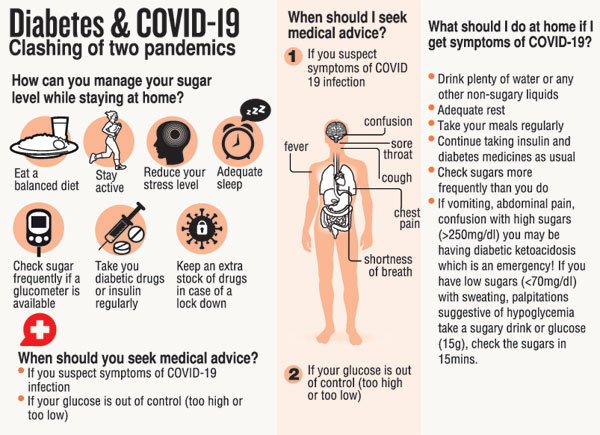News
Access to diabetes care
The strong link between COVID-19 and diabetes has been underscored, with an emphasis on the need to prevent and also control this non-communicable disease (NCD) to stop people from descending into severe illness and death due to the new coronavirus.
As countries celebrate World Diabetes Day 2021 with its theme of ‘Access to diabetes care’ today, the Sunday Times throws light on what has been happening in Sri Lanka even during these troubled times of the pandemic.
Quoting Sri Lanka’s data, the President of the Sri Lanka Diabetes Federation, Dr. Manilka Sumanatilleke details the efforts made by them, working in tandem with the Health Ministry’s Directorate of Non-Communicable Diseases and the federation’s own mother organisation, the Sri Lanka College of Endocrinologists, to keep diabetes at bay.
“Today, the Lions’ Club in collaboration with the federation will screen 100 people for diabetes in different locations across the country,” he said, explaining that they have to restrict the numbers because of the pandemic. There will also be awareness campaigns.

Yesterday, sessions on preventing and controlling diabetes through modern care protocols were held for doctors and nurses.
The need to make a concerted effort and keep building on what has been done before is obvious.
n The overall prevalence of diabetes has been reported as 10.3% in 2008 among those over 20 years of age
n This is while the prevalence in urban areas was reported to be much higher with 16.4%, compared to 8.7% in rural areas.
The federation has striven to continue improving awareness on diabetes among schoolchildren and the public, said Dr. Sumanatilleke.
“We continued the art and essay competition that we usually hold among children and youth as this will take the message from children to their homes and their parents, while parents who may have to help smaller children research about diabetes will also learn from such activity,” he says.
The federation has also distributed leaflets and held programmes to educate the public on the services being provided by Healthy Lifestyle Centres (HLC) and Diabetes Centres set up by the Health Ministry. Virtual health camps have also been conducted for children and young adults affected by type 1 diabetes.
Meanwhile, the Health Ministry has taken many steps over the years to optimize diabetic care access throughout the country. The HLCs screen and identify increased blood sugar levels and other NCDs free of charge and refer such patients for specialized care.
People over 35 years of age may seek such screening, while those between 20-34 years of age can seek screening if they have any risk factors.
Most government hospitals have dedicated Diabetic Clinics and state hospitals and most primary healthcare centres also have the essential diabetic drugs including insulin. Testing is also carried out by them. All expectant mothers, meanwhile, are monitored for gestational diabetes.
The major risk factors for diabetes are: unhealthy diet; physical inactivity; being overweight/obese; and genetic predisposition.

